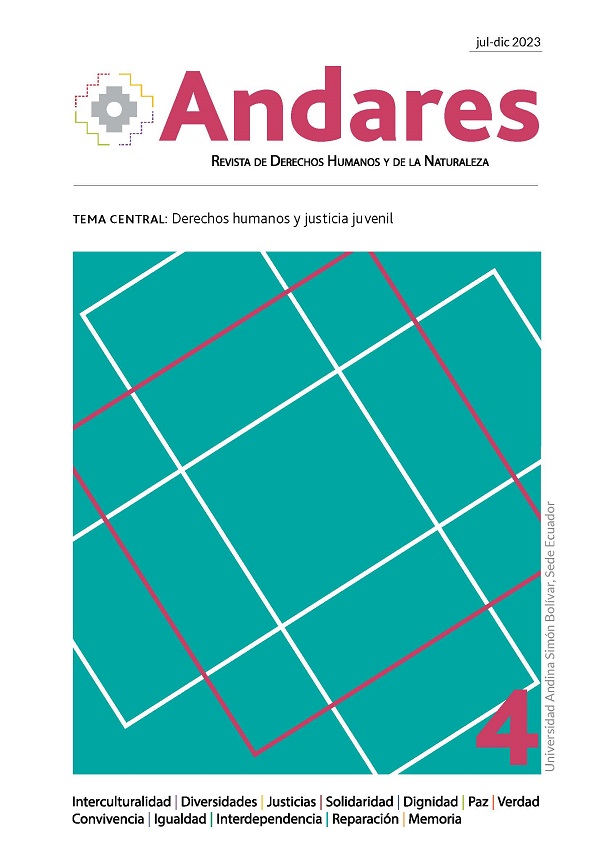Irracionalidad punitiva en Ecuador: Una mirada crítica desde el garantismo penal
DOI:
https://doi.org/10.32719/29536782.2023.2.2Palabras clave:
Garantismo penal, adolescentes infractores, cárceles, punitivismo, minimalismo penal, política penitenciaria, garantías fundamentales, derechos humanosResumen
La presente investigación aborda, desde la perspectiva del garantismo penal, lo que he denominado “irracionalidad punitiva”, término que refiere a un conjunto heterogéneo de prácticas punitivas que afectan a los fines constitucionales del sistema penal. Así, se indagan las condiciones carcelarias en el país, como las implicaciones de prácticas punitivas de tinte autoritario en la justicia penal juvenil. Examinar los antecedentes de estas prácticas punitivas permitió fijar dos objetivos puntuales que se desarrollan en este trabajo de investigación. El primero devela las razones por las cuales se escoge el paradigma garantista como salida a la situación violenta en la que se encuentra sumergida la justicia penal en general, de tal manera que se excluye una mirada punitiva o represiva. El segundo objetivo plantea la necesidad de contener dicha irracionalidad punitiva a través del respeto a los derechos humanos. Ambos objetivos son de carácter crítico-reflexivo. Para su consecución, se utilizaron las garantías de los derechos fundamentales, dentro del paradigma garantista del minimalismo penal o derecho penal mínimo. En la parte metodológica, se aplica la técnica de investigación documental, a fin de indagar en los textos las causas de esta irracionalidad, lo que permite descubrir varios de los nudos críticos que provocan la crisis en la esfera del sistema penal. De esta manera, se evidencia que la irracionalidad punitiva suele ser, entre otros factores, consecuencia del incremento de la población penitenciaria, de las prácticas punitivas sobre adultos y adolescentes, así como de la mirada antigarantista que irrespeta las garantías fundamentales. Impera entonces la necesidad de implementar el modelo del garantismo penal para salvaguardar la dignidad humana.
Descargas
Referencias
Ávila Santamaría, Ramiro. La (in)justicia penal en la democracia constitucional de derechos: Una mirada desde el garantismo penal. Quito: Edle, 2013.
Baratta, Alessandro. Criminología crítica y crítica al derecho penal. Buenos Aires: Siglo XXI, 2004.
Beck, Heinrich. “Concepto y presupuestos gnoseológicos del método inductivo”. Universidad de Navarra, 2007. https://tinyurl.com/5fyymb2m.
Bolio, Juan Pablo, y Héctor Bolio. “El método cualitativo etnográfico y su aplicación para los estudios jurídicos”. Revista Logos 4, n.° 2 (2013): 158-65. https://bit.ly/3vY7GWF. DOI: https://doi.org/10.22335/rlct.v4i2.199
Botero, Andrés. “La metodología documental en la investigación jurídica: Alcances y perspectivas”. Opinión Jurídica 2, n.° 4 (2003). https://tinyurl.com/ysd8wmjj.
Carranza, Elías. “Situación penitenciaria en América Latina y el Caribe: ¿Qué hacer?”. Anuario de Derechos Humanos 8 (2012): 31-66. https://tinyurl.com/ym7hhmmz. DOI: https://doi.org/10.5354/0718-2058.2012.20551
Christie, Nils. Una sensata cantidad de delito. Buenos Aires: Editores del Puerto, 2004.
Corte IDH. Opinión Consultiva OC-29/22. 30 de mayo de 2022. https://tinyurl.com/2c27bntp.
Donoso, Diego. “Prólogo”. En La rehabilitación social en el contexto latinoamericano, editado por Sebastián Ibarra, 11-4. Quito: Ministerio de Justicia, Derechos Humanos y Cultos, 2014.
Ecuador. Código Orgánico Integral Penal. Registro Oficial 180, Suplemento, 10 de febrero de 2014.
—. Constitución de la República del Ecuador. Registro Oficial 449, 20 de octubre de 2008.
Ecuador Corte Constitucional. “Sentencia”. En Causa n.° 9-17-CN/19, 9 de julio de 2019.
El Universo. “En trece años la población penitenciaria se triplicó en el Ecuador”. El Universo, 19 de marzo de 2021. https://tinyurl.com/2drxca4b.
Ferrajoli, Luigi. Derecho y razón: Teoría del garantismo penal. Madrid: Trotta, 2009.
Foucault, Michel. Vigilar y castigar: Nacimiento de la prisión. Ciudad de México: Siglo XXI, 2008.
Garland, David. Castigo y sociedad moderna: Un estudio de teoría social. Ciudad de México: Siglo XXI, 1999.
Guzmán, Carlos, y Carlos Tiffer. Responsabilidad penal del adolescente: Hacia la construcción de un derecho penal doblemente mínimo. Bogotá: Grupo Editorial Ibáñez, 2012.
Han, Byung-Chul. Psicopolítica: Neoliberalismo y nuevas técnicas de poder. Barcelona: Herder, 2016.
I Congreso Mundial de Justicia Juvenil Restaurativa. “Declaración de Lima sobre Justicia Juvenil Restaurativa”. Pensamiento Penal. Accedido 15 de septiembre de 2023. https://n9.cl/gynxip.
INEC. Boletín Técnico n.° 02-2023-CP: Censo Penitenciario. Quito: INEC, 2023. https://n9.cl/k0xm6.
Mathisien, Thomas. Juicio a la prisión. Buenos Aires: Ediar, 2003.
Matus Acuña, Jean-Pierre. “Ensayo sobre la función objetiva de las penas privativas de libertad. Sentencia de la Corte Europea de Derechos Humanos de 16 de julio de 2009, n.° 22635/03”. En La rehabilitación social en el contexto latinoamericano, editado por Sebastián Ibarra, 45-76. Quito: Ministerio de Justicia, Derechos Humanos y Cultos, 2014.
Nuñovero, Lucía. Cárceles en América Latina, 2000-2018: Tendencias y desafíos. Cuaderno de trabajo n.° 50, Pontificia Universidad Católica del Perú, noviembre de 2019. https://tinyurl.com/5ahvjx3p.
ONU Asamblea General. Convención sobre los derechos del niño. 20 de noviembre de 1989. https://acortar.link/4pIss.
Plan V. “3 de cada 10 presos han sido reincidentes y están en las cárceles más grandes de Ecuador”. Plan V, 18 de julio de 2023. https://n9.cl/cbisn.
Primicias. “Adolescentes cumplen sus condenas en centros deteriorados”. Primicias, 2 de diciembre de 2022. https://n9.cl/e67e4.
Sozzo, Máximo. La inflación punitiva: Un análisis comparativo de las mutaciones del derecho penal en América Latina, 1990-2015. Buenos Aires: Café de las Ciudades, 2017.
Zaffaroni, Eugenio, Alejandro Alagia y Alejandro Slokar. Manual de derecho penal: Parte general. Buenos Aires: Ediar, 2008.
—, Luigi Ferrajoli, Sergio Torres y Ricardo Basílico. La emergencia del miedo. Buenos Aires: Ediar, 2013.







